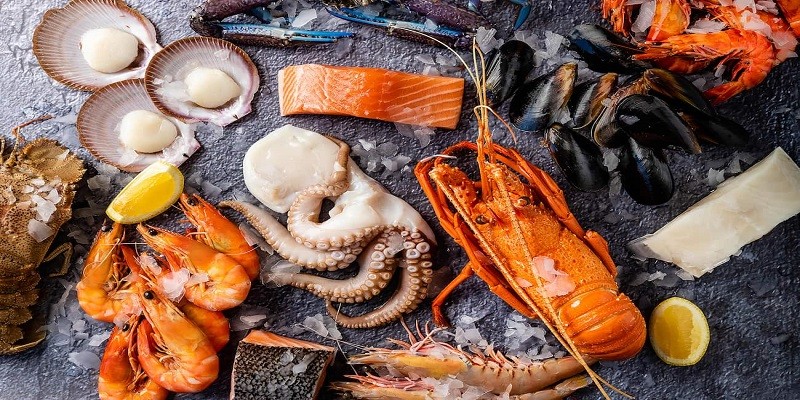Last Updated on January 15, 2025
Yes, you can eat seafood during pregnancy as long as it is cooked thoroughly and consumed in moderation. Seafood can be a valuable source of important nutrients necessary for the development of your baby.
Seafood is often considered a healthy food choice due to its high protein content and essential omega-3 fatty acids. However, some types of seafood contain high levels of mercury, which can be harmful to the developing fetus. To ensure the safety of your pregnancy, it is recommended to choose low-mercury options such as salmon, shrimp, catfish, and cod.
We will discuss the benefits of eating seafood during pregnancy, the types of seafood to avoid, and tips for safe consumption. By keeping these guidelines in mind, you can enjoy the health benefits of seafood without compromising the well-being of yourself and your baby.
The Importance Of A Balanced Diet During Pregnancy
Eating a balanced diet during pregnancy is crucial for the health and development of both the mother and the baby. During this critical time, the baby relies solely on the mother’s nutrition for growth, making it essential for expectant mothers to pay close attention to what they eat. A balanced diet ensures that the mother receives all the necessary nutrients, vitamins, and minerals needed to promote a healthy pregnancy and aid in the baby’s development.
Nutritional needs during pregnancy
When pregnant, a woman’s body undergoes numerous changes, and her nutritional needs increase significantly. It is important to include a variety of nutrients in her diet to support these changes and facilitate the baby’s growth. Some essential nutrients during pregnancy include:
- Folic Acid: Folic acid helps prevent birth defects and is important for the development of the baby’s brain and spine.
- Iron: Iron is responsible for producing hemoglobin, which carries oxygen to the baby. It also helps prevent anemia in the mother.
- Calcium: Calcium supports the baby’s bone development and helps maintain the mother’s bone health.
- Omega-3 Fatty Acids: Omega-3 fatty acids are crucial for the baby’s brain and eye development.
A well-balanced diet should consist of fresh fruits and vegetables, whole grains, lean proteins, dairy products, and healthy fats to ensure a sufficient intake of these essential nutrients.
Benefits of consuming seafood during pregnancy
Seafood is an excellent source of various nutrients that are essential during pregnancy. However, it is important to choose seafood options that are low in mercury, as high mercury levels can be harmful to the developing baby.
| Benefits | Seafood Sources |
|---|---|
| Protein | Fish, shrimp, crab |
| Omega-3 Fatty Acids | Fatty fish like salmon, trout, sardines |
| Iodine | Seaweed, white fish, cod |
| Vitamin D | Fatty fish, canned tuna (light), fortified dairy products |
| Zinc | Crab, oysters, lobster |
These nutrients are important for the baby’s growth and development, especially their brain, eyes, and immune system. Protein helps with the baby’s overall growth, while omega-3 fatty acids play a crucial role in brain development. Iodine is necessary for proper thyroid function, and vitamin D aids in calcium absorption, promoting healthy bone development.
However, it is essential to avoid high-mercury fish, such as shark, swordfish, king mackerel, and tilefish, as they can negatively impact the baby’s developing nervous system. Instead, choose low-mercury options, like salmon and shrimp, which are rich in beneficial nutrients without the harmful effects of high mercury levels.
A well-informed and balanced approach to consuming seafood during pregnancy can provide numerous health benefits for both the mother and the baby. As always, it is important to consult with a healthcare professional to determine the best dietary choices based on individual needs and circumstances.
Choosing Safe Seafood Options
The safety of seafood consumption during pregnancy is a topic of discussion among expectant mothers. While it is important to avoid certain types of seafood with high mercury levels, there are plenty of safe options that provide essential nutrients for both mother and baby. This article is aimed at helping pregnant women make informed choices by understanding mercury levels in seafood and identifying low-mercury options that they can enjoy. Let’s delve into this important aspect of choosing safe seafood options during pregnancy.
mercury levels in seafood
Mercury is a naturally occurring element found in water bodies, including oceans, rivers, and lakes. It is toxic and can negatively affect the development of a baby’s nervous system. Therefore, it’s crucial for pregnant women to be aware of the mercury levels in seafood and avoid high-mercury options.
Seafood with high mercury content includes shark, swordfish, king mackerel, and tilefish. These should be completely avoided during pregnancy. These large fish species tend to accumulate higher levels of mercury in their flesh as they consume smaller fish that are lower on the food chain. As a rule of thumb, the bigger the fish, the higher the potential for mercury contamination.
Low-mercury seafood options for pregnant women
Fortunately, there are many delicious and nutritious low-mercury seafood options that can be safely consumed during pregnancy. These varieties provide essential omega-3 fatty acids, protein, vitamins, and minerals that support the growth and development of the fetus.
Here’s a helpful list of low-mercury seafood choices that pregnant women can enjoy:
| Seafood Options | Approximate Mercury Level |
|---|---|
| Salmon | Low |
| Shrimp | Low |
| Prawns | Low |
| Tilapia | Low |
| Trout | Low |
| Cod | Low |
| Sardines | Low |
Besides these options, canned light tuna can also be consumed in moderation and is considered low in mercury. However, it is advised to limit consumption of albacore tuna due to its higher mercury content compared to canned light tuna.
When choosing seafood, it is recommended to opt for wild-caught varieties rather than farm-raised ones. Wild-caught fish have a more natural diet and tend to have lower mercury levels. Additionally, cooking methods like baking, grilling, or steaming are preferable as they retain the nutrients while minimizing further mercury exposure.
By choosing these low-mercury seafood options, pregnant women can continue to enjoy the benefits of seafood consumption while minimizing potential risks. Remember, a varied and balanced diet during pregnancy is key to the overall well-being of both mother and baby.
Safe Preparation And Consumption Of Seafood
Tips for cooking seafood to ensure safety
Eating seafood during pregnancy can have numerous health benefits for both the mother and the baby. However, it is crucial to take certain precautions to ensure the safety of seafood consumption during this delicate time. Here are some essential tips for properly cooking seafood to minimize the risk of foodborne illnesses:
- Cook seafood thoroughly: Cooking seafood effectively kills harmful bacteria and parasites. Ensure that all fish, shrimp, lobster, and other seafood options are cooked to an internal temperature of at least 145°F.
- Avoid cross-contamination: Prevent cross-contamination by keeping raw seafood separate from other food items. Use separate cutting boards, utensils, and plates for raw seafood to prevent the spread of bacteria.
- Store seafood properly: Ensure that seafood is stored at appropriate temperatures to maintain freshness and prevent the growth of harmful bacteria. Refrigerate or freeze seafood promptly after purchasing and follow the recommended storage guidelines.
- Don’t consume seafood with an “off” smell or appearance: Before cooking, check the seafood for any signs of spoilage such as a strong fishy odor, sliminess, or discoloration. If you notice any of these warning signs, it is best to discard the seafood to avoid foodborne illnesses.
- Opt for low-mercury seafood options: Certain types of fish and shellfish contain high levels of mercury, which can be harmful to the developing baby’s nervous system. Stick to low-mercury options such as salmon, shrimp, sardines, trout, and catfish. Avoid high-mercury fish like shark, swordfish, tilefish, and king mackerel.
Guidelines for consuming raw or undercooked seafood during pregnancy
While some seafood enthusiasts enjoy consuming raw or undercooked seafood delicacies, it is important to exercise caution during pregnancy. Follow these guidelines to minimize the potential risks:
- Avoid raw or undercooked seafood: It is recommended to avoid raw or undercooked seafood during pregnancy to reduce the risk of exposure to harmful bacteria, viruses, and parasites.
- Steer clear of sushi with raw seafood: Sushi can be a popular choice, but opt for sushi rolls that do not contain raw fish or seafood. Stick to vegetarian or fully cooked options to ensure safety.
- Cook oysters, clams, and mussels thoroughly: These shellfish are often served raw, but cooking them thoroughly eliminates any potential risks. Heat them until the shells open and the flesh is opaque.
By following these safety tips and guidelines, pregnant women can enjoy the many benefits of seafood while minimizing the potential risks to themselves and their babies. Remember, it is always advisable to consult with a healthcare provider for personalized recommendations regarding seafood consumption during pregnancy.

Credit: americanpregnancy.org
Frequently Asked Questions For Can You Eat Seafood During Pregnancy?
Can You Eat Seafood During Pregnancy?
Yes, seafood can be a nutritious choice during pregnancy. However, it’s important to choose certain types and cook them properly to ensure safety.
Is It Safe To Eat Sushi While Pregnant?
It’s generally recommended to avoid raw or undercooked seafood, including sushi, during pregnancy to reduce the risk of foodborne illnesses and mercury exposure.
What Types Of Seafood Should I Avoid During Pregnancy?
High-mercury fish such as king mackerel, shark, and swordfish should be avoided. Also, be cautious with raw or undercooked seafood and choose low-mercury options like salmon or shrimp.
How Can I Safely Enjoy Seafood During Pregnancy?
To safely enjoy seafood, choose fish with low mercury levels, cook seafood thoroughly, and practice proper hygiene and food storage techniques.
What Are The Benefits Of Eating Seafood During Pregnancy?
Eating seafood during pregnancy can provide essential nutrients like omega-3 fatty acids, protein, and vitamins and minerals that support fetal development and the mother’s health.
Conclusion
It is safe to eat seafood during pregnancy as long as certain precautions are taken. Choosing low-mercury options like salmon, shrimp, and trout can provide essential nutrients while minimizing risks. It is also important to ensure that the seafood is cooked thoroughly to prevent bacterial contamination.
By making informed choices and following recommended guidelines, expecting mothers can enjoy the benefits of seafood without compromising their health or the health of their baby.







